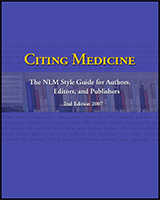NCBI Bookshelf. A service of the National Library of Medicine, National Institutes of Health.
Patrias K, author; Wendling D, editor. Citing Medicine: The NLM Style Guide for Authors, Editors, and Publishers [Internet]. 2nd edition. Bethesda (MD): National Library of Medicine (US); 2007-.

Citing Medicine: The NLM Style Guide for Authors, Editors, and Publishers [Internet]. 2nd edition.
Show detailsBox 6Names in non-roman alphabets (Cyrillic, Greek, Arabic, Hebrew, Korean) or character-based languages (Chinese, Japanese)
Romanization, a form of transliteration, means using the roman (Latin) alphabet to represent the letters or characters of another alphabet. A good authority for romanization is the ALA-LC Romanization Tables.
- Romanize names if they are in Cyrillic (Russian, Bulgarian, etc.), Greek, Arabic, Hebrew, or Korean, or character-based languages, such as Chinese and Japanese
- Capitalize only the first letter of romanized names if the original initial is represented by more than one letter
- Iu. A. Iakontov; becomes Iakontov IuA
- G. Th. Tsakalos; becomes Tsakalos GTh
- Ignore diacritics, accents, and special characters in names. This rule ignores some conventions used in non-English languages to simplify rules for English-language publications.
- Treat letters marked with diacritics or accents as if they are not marked
- Å treated as A
- Ø treated as O
- Ç treated as C
- Ł treated as L
- à treated as a
- ĝ treated as g
- ñ treated as n
- ü treated as u
- Treat two or more letters printed as a unit (ligated letters) as if they are two letters
- æ treated as ae
- œ treated as oe
- Box 6, Names in non-roman alphabets (Cyrillic, Greek, Arabic, Hebrew, Korean) or...Box 6, Names in non-roman alphabets (Cyrillic, Greek, Arabic, Hebrew, Korean) or character-based languages (Chinese, Japanese) - Citing Medicine
Your browsing activity is empty.
Activity recording is turned off.
See more...